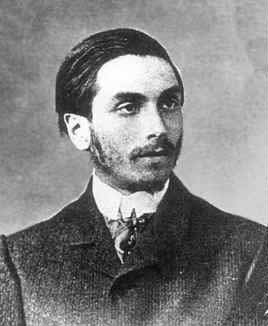

تاريخ الرياضيات

الاعداد و نظريتها

تاريخ التحليل

تار يخ الجبر

الهندسة و التبلوجي


الرياضيات في الحضارات المختلفة

العربية

اليونانية

البابلية

الصينية

المايا

المصرية

الهندية


الرياضيات المتقطعة

المنطق

اسس الرياضيات

فلسفة الرياضيات

مواضيع عامة في المنطق


الجبر

الجبر الخطي

الجبر المجرد

الجبر البولياني

مواضيع عامة في الجبر

الضبابية

نظرية المجموعات

نظرية الزمر

نظرية الحلقات والحقول

نظرية الاعداد

نظرية الفئات

حساب المتجهات

المتتاليات-المتسلسلات

المصفوفات و نظريتها

المثلثات


الهندسة

الهندسة المستوية

الهندسة غير المستوية

مواضيع عامة في الهندسة

التفاضل و التكامل


المعادلات التفاضلية و التكاملية

معادلات تفاضلية

معادلات تكاملية

مواضيع عامة في المعادلات


التحليل

التحليل العددي

التحليل العقدي

التحليل الدالي

مواضيع عامة في التحليل

التحليل الحقيقي

التبلوجيا

نظرية الالعاب

الاحتمالات و الاحصاء

نظرية التحكم

بحوث العمليات

نظرية الكم

الشفرات

الرياضيات التطبيقية

نظريات ومبرهنات


علماء الرياضيات

500AD

500-1499

1000to1499

1500to1599

1600to1649

1650to1699

1700to1749

1750to1779

1780to1799

1800to1819

1820to1829

1830to1839

1840to1849

1850to1859

1860to1864

1865to1869

1870to1874

1875to1879

1880to1884

1885to1889

1890to1894

1895to1899

1900to1904

1905to1909

1910to1914

1915to1919

1920to1924

1925to1929

1930to1939

1940to the present

علماء الرياضيات

الرياضيات في العلوم الاخرى

بحوث و اطاريح جامعية

هل تعلم

طرائق التدريس

الرياضيات العامة

نظرية البيان
Pierre Léon Boutroux
المؤلف:
R S Calinger
المصدر:
Biography in Dictionary of Scientific Biography
الجزء والصفحة:
...
31-5-2017
1260
Died: 15 August 1922 in France

Pierre Boutroux's father, Émile Boutroux, was a famous philosopher of science. His mother was Aline Catherine Eugénie Boutroux who was a sister of Poincaré and so he was also related to the other men of great distinction in that family.
Boutroux was educated in Paris at the École Normale Supérieure and he received his licentiate with a thesis, which was published by the University of Paris, L'imagination et les mathématiques selon Descartes. Following this he was appointed as a lecturer in mathematics at the University of Montpellier before becoming professor of integral calculus at Poitiers in 1908.
Although Boutroux held this chair in Poitiers for twelve years he spent much of the time at other institutions. He spent 1909 as a visiting professor at the University of Nancy. There he lectured at the Collège de France on functions which are the solutions of first order differential equations. Following this he went to the United States where he occupied the mathematics chair at Princeton from 1913 until 1914. He became chairman of the graduate mathematics department there in 1914. When World War I broke out, however, he returned to France to join the army.
During the war Boutroux served bravely in the French army. At the end of the war he did not return to the United States but decided to stay in France. In 1920 he resigned the chair in Poitiers which he had held since 1908 and accepted a chair in the history of science at the Collège de France. Sadly he died in 1922 and the chair in the history of science was discontinued. All historians of science feel great sadness at knowing that had Boutroux occupied the chair for many years then his brilliance would have established a chair which almost certainly would have continued.
Boutroux's mathematical work mainly consists of extending and clarifying work of others, in particular that of Painlevé, Poincaré and Émile Picard. He worked on multiform functions and also continued Painlevé's work on singularities of differential equations. Although his work in these areas is a useful contribution, this was not the area in which Boutroux excelled. That area was the history and philosophy of mathematics.
In the history and philosophy of mathematics Boutroux published an extremely important work Les principes de l'analyse mathématique in two volumes; Volume 1 in 1914 and Volume 2 in 1919.
Calinger writes in [1]:-
These volumes contain a comprehensive view of the whole field of mathematics in the second decade of the twentieth century, both as a body of knowledge and as a mode of thought. Boutroux's topics range from rational numbers to an analysis of the notion of a function. In light of the historical method used by the author, he might better have entitled this book "An Analysis of the Progress of Mathematical Thought".
Another, perhaps even more important work, is Boutroux's L'idéal scientifique des mathématiciens dans l'antiquité et dans le temps modernes. His main thesis in this work is to argue for the unity of the history of science which, he argues, can only be understood when considered as a whole and not by specialist examination of the parts. Boutroux also argues that there is no single way to approach a problem, but the nature of the problem itself dictates the best way to attack it.
Boutroux produced an edition of Pascal's works which was published from 1908 onwards with a second edition appearing after Boutroux's death in 1929. He also contributed to producing a volume on the scientific and philosophical works of Poincaré. Other work included a study of dynamics before Newton where he improved on Duhem's work, and an analysis of the work of Paul Tannery which was not published until 1938, sixteen years after Boutroux's death.
- R S Calinger, Biography in Dictionary of Scientific Biography (New York 1970-1990).
http://www.encyclopedia.com/doc/1G2-2830900575.html
Articles:
- L Brunschvicg, L'oeuvre de Pierre Boutroux, Revue de métaphysique et de morale 29-30 (1922), 285-289.
- Lettre de M Pierre Boutroux a M Mittag-Leffler, in The mathematical heritage of Henri Poincaré 2 (Providence, R.I., 1983), 441-445.
 الاكثر قراءة في 1880to1884
الاكثر قراءة في 1880to1884
 اخر الاخبار
اخر الاخبار
اخبار العتبة العباسية المقدسة

الآخبار الصحية















 قسم الشؤون الفكرية يصدر كتاباً يوثق تاريخ السدانة في العتبة العباسية المقدسة
قسم الشؤون الفكرية يصدر كتاباً يوثق تاريخ السدانة في العتبة العباسية المقدسة "المهمة".. إصدار قصصي يوثّق القصص الفائزة في مسابقة فتوى الدفاع المقدسة للقصة القصيرة
"المهمة".. إصدار قصصي يوثّق القصص الفائزة في مسابقة فتوى الدفاع المقدسة للقصة القصيرة (نوافذ).. إصدار أدبي يوثق القصص الفائزة في مسابقة الإمام العسكري (عليه السلام)
(نوافذ).. إصدار أدبي يوثق القصص الفائزة في مسابقة الإمام العسكري (عليه السلام)


















